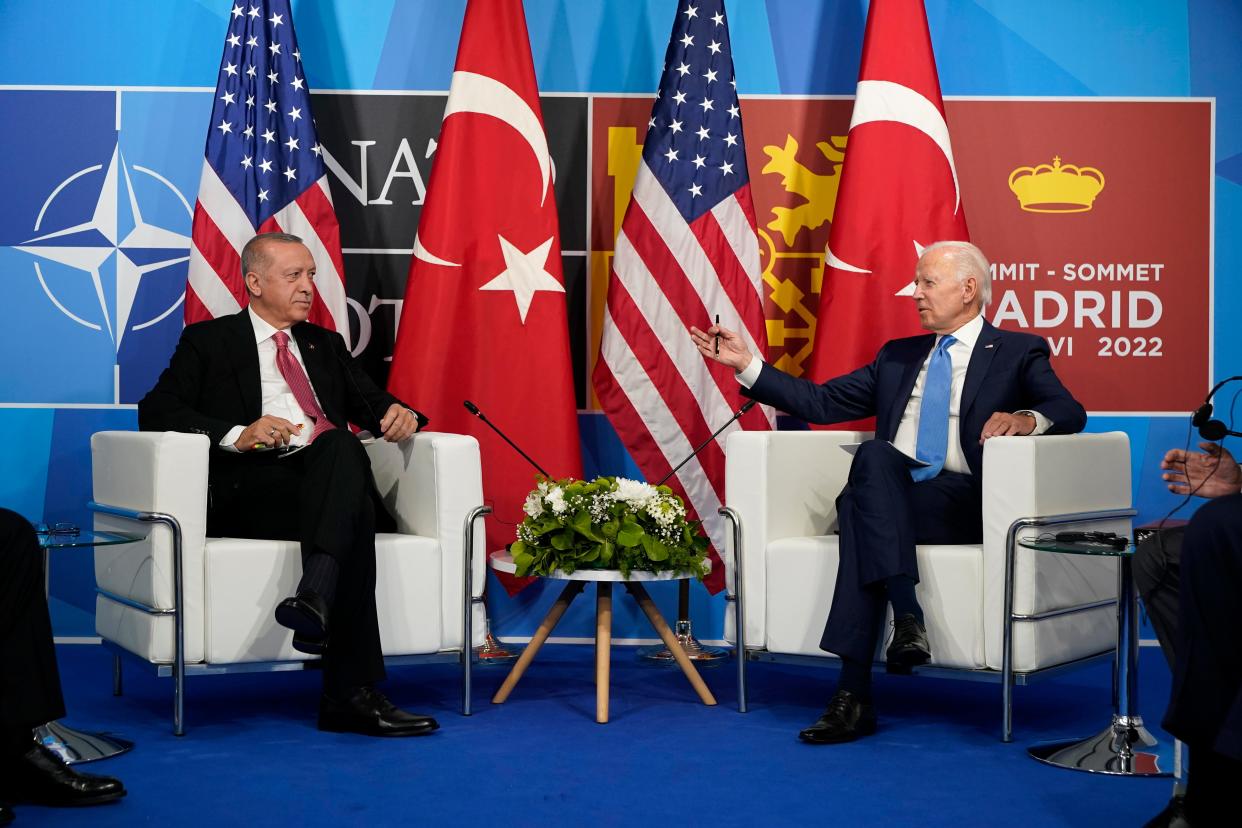Arthur Cyr: Turkey brokers Russia-Ukraine deal

- Oops!Something went wrong.Please try again later.
- Oops!Something went wrong.Please try again later.
On July 22, warring nations Russia and Ukraine, along with Turkey and the United Nations, signed an important agreement to allow grain exports to resume from Ukraine. Moscow had blocked the shipments. Turkey announced the agreement on July 21.
Turkey remains a bulwark against Islamic extremism, and traditionally a reliable ally of the United States, both within and well beyond the North Atlantic Treaty organization (NATO). Turkish culture emphasizes warrior prowess, and here national success historically is notable.
Autocrat Recep Tayyip Erdogan has been in power as prime minister and now president since 2003. Over this lengthy tenure, he has curtailed democratic freedom and expanded his arbitrary authority.

Given these retrograde developments, people easily overlook Turkey’s geostrategic importance. This is especially true in the United States, where the mass media generally focus on more superficial aspects of news. Despite the horrific 9/11 terrorist attacks, and domestic debate over immigration, we remain a relatively secure nation.
Yet realism requires recognizing the importance of Turkey for regional stability and our own national security. The nation continues pursuit of economic modernization. This includes expanding trade and investment, reaching significantly into Central Asia as well as Europe.
Additionally, Turkey has been able to maintain reasonably good cooperative relations at the working level within Europe and the U.S. Economic development reinforces security relationships.
Practical NATO ties are relatively strong. Turkey’s military is the second largest in NATO, after the U.S. Turkey was a major combatant in the Korean War. In Afghanistan, the nation was a leader. Turkey oversees vital sea and land routes, including the Bosporus Strait, which controls access between the Black Sea and the Mediterranean.
Turkey has proven willing to use leverage provided by geography and water. This includes but also reaches well beyond the Bosporus. Turkey controls the headwaters of the Euphrates and Tigris rivers, vital water sources for Iraq and Syria.
In 1998 Kurd separatist leader Abdullah Ocalan of the Kurdistan Workers’ Party (PKK), enemy of Turkey, sought sanctuary in Syria. After a four-week standoff, Syria expelled him. Ankara had threatened to turn off the water.
Turkey is also strategically pivotal, Western in practices but with a Moslem majority population. The successful revolution in the 1920s led by Mustafa Kemal Ataturk established Turkey’s secular constitution. Terrorist groups have not gained support and Islamic extremism remains weak.
From the thirteenth century, to rapidly accelerating decline in the nineteenth century, the Ottoman Empire — which crested at the Danube in Europe — relied on military power reinforced by secular executive practices. Industrialization remained alien.
That has changed. Over the past decades of the 20th century, the economy became a powerhouse. Economic growth and investment flourished, corruption and inflation dropped significantly, and government red tape and bottlenecks were steadily reduced.
Great credit belongs to reform Prime Minister and President Turgut Özal, who held office from 1983 to 1993. Friendship with President George H.W. Bush facilitated basing U.S. B-52 bombers in Turkey during the Gulf War of 1990-91.
In 2015, Turkey hosted the Group of 20 industrial nations, but today is in economic trouble. This provides the United States with opportunity for renewed leadership, largely neglected in this century.
President George H.W. Bush and associates earned great credit for outstanding regional leadership. In 1990-91, the U.S.-led coalition with UN authorization drove the Iraq army from occupied Kuwait. Decisive victory was followed up by effective diplomacy.
U.S. leadership today should emphasize security ties, while resisting Erdogan’s domestic excesses. Bush and company provide the example.
— Arthur I. Cyr is author of “After the Cold War” (NYU Press and Macmillan/Palgrave). Contact acyr@carthage.edu.
This article originally appeared on The Sault News: Arthur Cyr: Turkey brokers Russia-Ukraine deal

